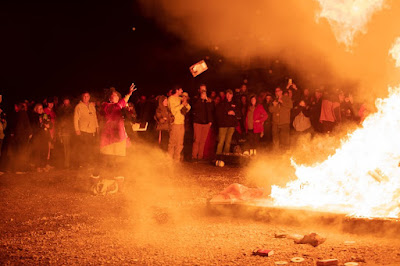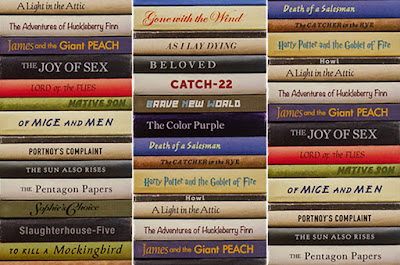 |
| Fahrenheit 451: Followers of Christian pastor Greg Locke toss books onto a bonfire in Nashville suburb Mt. Juliet, Tennessee, on February 2, 2022. Books that burned included selections from the Harry Potter and Twilight series (these encourage devil-worship and witchcraftery), among many others. One counter-protester tossed the Bible on there. Greg Locke is also known for encouraging his followers to attend the January 6, 2021 Capitol riot. |
If you're like Thee Optimist, you have a tendency to read books. Maybe you read them on some kind of computerized device, or maybe you read them the old fashioned way. But you do read them.
Here in the Land of the Free, to our everlasting credit, we have a history of writing books and reading books. We value the freedom to think our own thoughts, and speak our minds. We also value the freedom to set our thoughts down in writing, and we value the freedom of others to do the same.
Indeed, the Founding Fathers considered this such a bedrock freedom, that when they first amended the United States Constitution, the very First Amendment guaranteed the right of free speech.
Not everyone who lives here agrees with this right, of course. The United States also has a history of people (especially Christian conservative types) trying to get certain books banned or removed (especially from public school libraries).
Generally, these efforts work for a while, then get ground down and trampled under. Mostly, this is because American history, and the law of the land, gives the benefit of the doubt to free speech.
For example, a 1982 Supreme Court split decision ruled "that local school boards may not remove books from school library shelves simply because they dislike the ideas contained in those books and seek by their removal to 'prescribe what shall be orthodox in politics, nationalism, religion, or other matters of opinion.'"
In that case, a school board in the town of Island Trees, New York was trying to remove 11 books from its library shelves, including Slaughterhouse Five by Kurt Vonnegut, Black Boy by Richard Wright, The Fixer by Bernard Malamud, and A Modest Proposal, by Jonathan Swift.
In recent months, attempts at banning books have picked up steam again. Indeed, the American Library Association calls these latest attempts "unprecedented."
Let's see how a couple of the efforts are coming along, shall we?
Maus Gets Eaten
On January 10, 2022, the 10-member school board of McMinn County, Tennessee (what in heck is going on in Tennessee?) voted unanimously to remove the graphic novel Maus from school bookshelves.
The Pulitzer Prize winning book is often praised for its ability to make the Holocaust understandable to young readers. That didn't impress the McMinn school board, however.
Related Article: Here's what's going on in Tennessee.
What the school board claimed to be concerned about in Maus was "rough, objectionable language," and the nude drawing of a woman (well, actually a female mouse - a depiction of the author's mother after she committed suicide in a bathtub), which they referred to as "disturbing imagery."
In response, the book's author Art Spiegelman suggested that the school board members were asking, "Why can't they teach a nicer Holocaust?"
The ban itself has treated Spiegelman pretty well. McMinn County is a relatively tiny place (less than 54,000 people live there - in comparison, 81,000 people routinely attend Green Bay Packers games at Lambeau Field).
And when word of the ban reached the major media, it catapulted Maus to the top of the bestseller lists, not necessarily in McMinn County, but pretty much everywhere else.
Spiegelman immediately received film and TV offers from Hollywood. Which he turned down. Spiegelman has always refused to allow Maus to be made into a movie or TV show.
As for the McMinn school board, they've found themselves getting hammered by everybody from the United States Holocaust Museum, to the Smithsonian Institution, and even the Daily Yonder.
 |
| Keller, Texas is a well-to-do suburb of Forth Worth, with just under 50,000 residents. They've found themselves in a little bit of a dust-up over books available in the public school libraries. |
The Strange Case of Keller
Beginning in October of 2021, and continuing to the present moment, the public schools in Keller, Texas have received a slew of requests from local parents to investigate and remove books from the school libraries.
More than 100 requests have been received thus far, so many that it suggests they're part of an organized effort.
Most of the books being challenged are written by black or Hispanic authors, or deal with issues of racism, sexism, homosexuality and gender identity. Many of them have been challenged on the grounds that they are obscene.
Whereas the Keller school district has responded to these requests by flagging the books for possible removal, it hasn't removed the books pending its own investigation into them. This (lack of) action is consistent with the 1982 Supreme Court ruling cited above.
This (lack of) action has also led to an investigation by the Texas Education Agency (TEA) as to whether the Keller school district has engaged in criminal activity by giving students access to books with sexually explicit content.
The governor of Texas, Greg Abbott, has overseen a Covid slaughterhouse in his state, is up for re-election this year, and needs to throw red meat to his political base. So he has directed the TEA to look into school libraries making pornography available to minors, and prosecute any such cases "to the fullest extent of the law."
As if children don't have access to pornography everywhere they go.
 |
| An image of some books that have been banned in the United States at one time or another. Yes, I'm not blind. I can see that the titles repeat. |
What's Good About Banned Books?
The efforts described above are far from the only ones going on. And the book bonfire shown above isn't the only one that's been called for.
Currently, there are dozens of these pushes (or should I say putsches?) happening. Somewhat close to home, a conservative group in Polk County, Florida is seeking to have 16 books removed from the public schools.
In the Florida case, the school district has caved in and removed the books pending review, which is exactly the opposite of what the 1982 Supreme Court ruling intended.
Not everybody is a profile in courage.
What's interesting about all this is how little the effect of banned books on actual children has been studied. Yes, we know that a lot of great or important books have been banned before, including the Great Gatsby, the Catcher in the Rye, the Communist Manifesto, the Color Purple, and many others.
Gwinnett County, Georgia once banned the Basketball Diaries, an important and formative book for Thee Optimist during his misspent yoot.
But what do we really know about what happens to kids when they read this filth? Not a whole lot.
One study determined that reading banned books didn't predict whether a child would become involved in crime, nor did it seem to have any impact on a child's grade point average in school.
What it did suggest is that reading banned books is correlated with a higher likelihood of positive civic behaviors like volunteering. But correlation is not causation, as you well know by now.
Why do kids who read banned books volunteer more than other kids? Maybe they're just more curious, or more interested in the world than other kids.
Or maybe reading banned books helps them understand other points of view, and leads them to want to engage with people more unfortunate than themselves.
Some groups think we should encourage kids to read banned books, and believe there are benefits to doing so.
As far as Thee Optimist is concerned, getting kids to read nearly any book is better than having them watching idiocy on their cell phones all the time.
 |
| Thee Optimist had this thing in his backpack for years. |
Words of Wisdom
"The trouble with quotes on the internet is that it's difficult to determine whether or not they are genuine."
- Abraham Lincoln


No comments:
Post a Comment